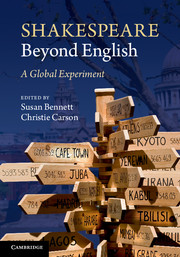Book contents
- Frontmatter
- Contents
- List of Illustrations
- List of colour plates
- Notes on contributors
- Foreword
- Acknowledgements
- Introduction
- The Globe to Globe Festival: An Introduction
- Performance Calendar
- Week One
- Week Two
- Week Three
- Week Four
- Chapter Twenty-Three Shakespeare 2012/Duchamp 1913
- Chapter Twenty-Four Foreign Shakespeare and the uninformed theatre-goer
- Chapter Twenty-Five The right to the theatre
- Chapter Twenty-Six ‘Playing’ Shakespeare
- Chapter Twenty-Seven Romeu e Julieta (reprise)
- Week Five
- Week Six
- Afterwords
- Index
- Plate section
- References
Chapter Twenty-Six - ‘Playing’ Shakespeare
Marjanishvili, Georgia's As You Like It
Published online by Cambridge University Press: 05 June 2014
- Frontmatter
- Contents
- List of Illustrations
- List of colour plates
- Notes on contributors
- Foreword
- Acknowledgements
- Introduction
- The Globe to Globe Festival: An Introduction
- Performance Calendar
- Week One
- Week Two
- Week Three
- Week Four
- Chapter Twenty-Three Shakespeare 2012/Duchamp 1913
- Chapter Twenty-Four Foreign Shakespeare and the uninformed theatre-goer
- Chapter Twenty-Five The right to the theatre
- Chapter Twenty-Six ‘Playing’ Shakespeare
- Chapter Twenty-Seven Romeu e Julieta (reprise)
- Week Five
- Week Six
- Afterwords
- Index
- Plate section
- References
Summary
In Star Trek: New Voyages, ‘Blood and Fire: Part One’ (2008), the aptly named Russian agent, Lieutenant Pavel Chekov, remarks: ‘Somebody didn't know their Shakespeare very well. A Russian wouldn't make that mistake.’ This popular culture reference shows the degree to which Russians are seen as having adopted Shakespeare as part of their heritage, particularly since the fall of the Soviet Union some twenty years ago. It is against this background that the Marjanishvili Theatre from Tbilisi, Georgia, presented their version of As You Like It. Similarly, they drew upon another part of their heritage, most specifically their Russian theatrical lineage, with its interest in physical embodiment and depth of character, to inform a production that meshed Shakespeare and Chekhovian styles to great effect.
The Marjanishvili State Drama Theatre, named after Kote Marjanishvili, their founding director, was first established in Kutaisi, Georgia, in 1928 and moved to its home at the Zubalashvili's Public House, Tbilisi, in 1930. Marjanishvili, of Georgian birth, worked for over twenty-five years as a director in Russia alongside such innovators as Stanislavsky, Nemirovich-Danchenko, Meyerhold and Vakhtangov. Of particular note is that Marjanishvili worked as an assistant to Edward Allen Craig on his production of Hamlet in 1911 at the Moscow Art Theatre. It was a production which dangerously recast the relationship between theatre, visual design and acting. By the 1920s Marjanishvili had returned to Georgia, and in 1925 he staged an acclaimed version of Hamlet for the Rustaveli Theatre. Since then, Shakespeare has been a central feature of the repertoire of the Marjanishvili company. The theatre's profile was significantly developed internationally through a 1984 performance of then director Temur Chkheidze's Othello at Weimar, Germany, to mark the Shakespeare International Conference held to celebrate Shakespeare's birthday. The production later toured to Bulgaria in 1987 and in 1990 was invited to the Glasgow International Theatre Festival. Further internationalization of their Shakespeare productions was achieved in 1996 when King Lear toured to the Edinburgh International Festival, Prague, Russia and Poland.
- Type
- Chapter
- Information
- Shakespeare beyond EnglishA Global Experiment, pp. 208 - 211Publisher: Cambridge University PressPrint publication year: 2013

